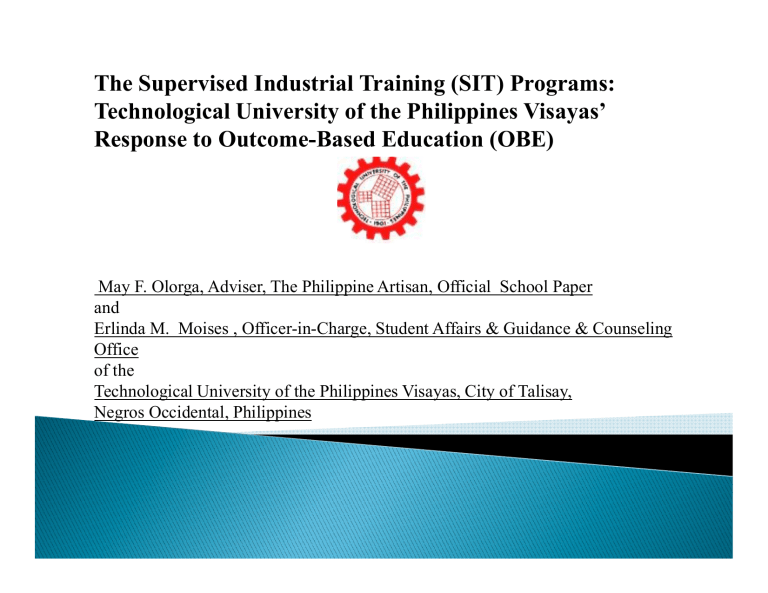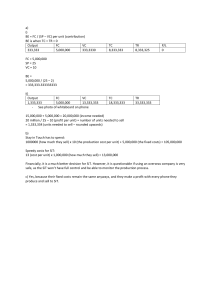
The Supervised Industrial Training (SIT) Programs: Technological University of the Philippines Visayas’ Response to Outcome-Based Education (OBE) May F. Olorga, Adviser, The Philippine Artisan, Official School Paper and Erlinda M. Moises , Officer-in-Charge, Student Affairs & Guidance & Counseling Office of the Technological University of the Philippines Visayas, City of Talisay, Negros Occidental, Philippines The Technological University of the Philippines Visayas, established in 1977 as Visayas Technician Institute, is one of the four campuses comprising the TUP system. Its 3-year Engineering Technology program leads to a 4-year Bachelor of Science in Engineering Technology and the 5- year Bachelor of Science in Electronics Communication Engineering and the Bachelor of Science in Mechanical Engineering degrees. It also offers Bachelor of Technology major in Mechatronics Technology. Ever since its inception as a prototype state school, the school allows and makes arrangements for on-the-job training of its students in private business establishments, shops, factories, warehouses and other facilities based on a joint program developed by the school and participating private entities. An industrial component phase is built in the curriculum of TUP Visayas. The 6-weeks Supervised Industrial Training (SIT) I for First Year students who satisfactorily complied their academic requirements; the 6-weeks SIT 2 for second year students who satisfactorily complied with all the second year academic requirements; and the 20-weeks SIT 3 for third year students who satisfactorily complied with all the 3rd year requirements and the first two stages of the SIT phase. Such on-the-job training programs allow the students to have a hands-on practice, besides real experiential exposure for the students to the real world of work. Moreover, not only the necessary skills are nurtured and developed by the program but also the holistic development of the knowledge, skills, and attitude of the students. The SIT Program also helps the students land a job in the world of industry, even before graduation. This presentation will discuss the Supervised Industrial Training programs of the Technological University of the Philippines Visayas and relate such with the thrusts of Outcomes-Based Education. Specifically, this paper will : A. discuss the curricular offerings of TUPVisayas; B. explain the requisites of the Supervised Industrial Training (SIT); C. present a sample list of the various companies which give the students their Supervised Industrial Training experience ; D. describe the average rating of the student in their Supervised Industrial Training; E. point out similarities of the Supervise Industrial Training with the principles of Outcome Based Education. Scope and limitation of the study Data were culled from the following offices of the Technological University of the Philippines Visayas: Registrar, Academic Affairs, and the Industrial Relations and Job Placement. Sources of said information are all considered public documents (grades, Student Handbook, SIT Booklet, SIT Directory, etc.) Thus, having such public documents, validity of data is not an issue . Related readings concerning Outcome Based Education were taken from the internet. Backgrounder Issuance of the Presidential Letter of Instruction No. 654 in January 1978 formally established the Visayas and Manila Technician Institutes as prototype state schools. Said LOI also specified that the schools should allow and make arrangements for on-the-job training of their students in private business establishments, shops, factories, warehouses and other facilities based on a joint program developed by the school and participating private concerns. Letter of Instruction (LOI) No. 79 issued by President Ferdinand E. Marcos on December 28, 1978 authorizing TUP to administer the operation of THEN Visayas Technician Institute. In 1985, pursuant to TUP Implementing Order No. 85-15, the Visayas Technician Institute was renamed the TUP Visayas campus. TUP Visayas is situated in Talisay City, Negros Occidental with a branch located in Sagay City. The academic offerings of TUP Visayas campus are in the 3-year Technology courses, Bachelor degrees, and Master degrees in Management and Technology. MISSION. The Technological University of the Philippines Visayas ,as the center of excellence in technological education and training, is committed to be a vibrant catalyst of change for the industrial development of the country by exploring more demand –driven, relevant and sustainable pioneering programs. It will continue to nurture its students to develop proper knowledge, skills and attitudes required in the global economic environment. It will ensure its lead role at the cutting edge of technological education through vigorous pursuits in research and extension programs. VISION The Technological University of the Philippines will be the center of excellence in technological education and training. It will be managed by highly trained, dynamic, productive personnel to produce globally competitive and values-oriented graduates. Provide higher and advanced technological education and training which will set the leadership in the technical ,industrial , technological and related professional fields. Provide a stream of trained manpower , highly qualified and competent in technical skills , as an approach to matching manpower needs in the region and the nation. Pursue research and development programs dovetailed to national priorities. Complement efforts in the transfer of technology to the countryside through extension services to balance access to education and training opportunities. TUPVISAYAS CURRICULAR OFFERINGS TUPVisayas offers four degree programs, three of which are technician based, namely the 5- year Bachelor of Science in Electronics Engineering (BSSECE), 5-yearBachelor of Science in Mechanical Engineering, and the 4-year Bachelor of Science in Engineering Technology. Now on its 3rd year is the newly –offered Bachelor of Technology major in Mechatronics Technology. The 3-year non –degree Engineering Technology Programs which lead to the Bachelor of Science in Engineering Technology are: Automotive, Chemical, Electrical, Electronics, Mechanical, Refrigeration and Air-conditioning, Electro-Mechanical and Computer, all Engineering Technologies which follow the ladderized curriculum. TUPV@ Sagay City also offers Automotive and Electronics Engineering programs which lead to BSET. A school year in TUPV is divided into 3 terms plus summer sessions involving the industrial component phase. SUPERVISED INDUSTRIAL TRAINING (SIT) STATEMENT OF PURPOSE The Supervised Industrial Training (SIT) is intended to provide industrial experiences to students so that they will be able to gain the necessary knowledge , skills and work attitudes consistent with the requirements of the industry , thereby becoming more effective, efficient and productive citizens of the country. For SIT 1 , 2 & 33- Skills Required FIRSTYEAR ENGINEERING TECHNOLOGY Basic skills in Machining, Computer Operation, Welding, Sheet Metal & other related Technical Works. AUTOMOTIVE ENGINEERING TECHNOLOGY Repair and maintenance of transport systems (cars, van, trucks, trailers….) CHEMICAL ENGINEERING TECHNOLOGY Laboratory standard tests, quality assurance, waste water analysis. ELECTRICAL ENGINEERING TECHNOLOGY Installation, repair and maintenance in electrical power generation, power distribution and power utilization systems. ELECTRONICS ENGINEERING TECHNOLOGY Troubleshooting, repair and maintenance of electronic machines & industrial controls in semiconductors, electronic and communications establishment. MECHANICAL ENGINEERING TECHNOLOGY Mechanical workshop operation, manufacturing, quality control, inspection & metal fabrications. ELECTRO-MECHANICAL ENGINEERING TECHNOLOGY Installation, maintenance and troubleshooting of industrial instrumentation equipment’s (PLC’s, pneumatic systems…etc.), workshop & lathe operations. and metal fabrications. COMPUTER ENGINEERING TECHNOLOGY Hardware & Software troubleshooting and maintenance as well as programming, application, & hardware interfacing. ELECTRONICS & COMMUNICATION ENGINEERING TECHNOLOGY ( leading to BSECE ) Maintenance of electronic equipment’s in semiconductors & electronic communication facilities. MECHANICAL ENGINEERING TECHNOLOGY ( leading to BSME ) Mechanical workshop operations, manufacturing, and metal fabrications REFRIGERATION & AIRCONDITIONING ENGINEERING TECHNOLOGY Troubleshooting, repair and maintenance of commercial and Industrial refrigeration systems. Be of 1st year or 2nd year standing status (having passed all academic requirements). ◦ Be physically fit by passing a Medical Examination by the school physician. ◦ Submit the following requirements: (NSO Birth Certificate, Police Clearance,1” X 1” recent colored ID picture,2” X 2” recent colored ID picture, Signed Parent’s Waiver, Accomplished SIT Clearance, Copy of Medical Clearance from the University Clinic, Company requirements as required by the company, Have enrolled for SIT 1 or SIT 2 Program Guidelines for the 2020- Week SIT 3 Be a 3rd year full standing status (having passed all academic requirements including SIT 1 & 2). Be physically fit by passing a Medical Examination by the school physician and / or designated Medical Clinic by the company. Submit the following standard University requirements: (1 photocopy NSO Birth certificate,1 photocopy latest Police Clearance, 1 photocopy latest NBI Clearance ,1 photocopy SSS E-1 form , 2 pcs. recent colored 1”X 1” ID picture w/ white background,2 pcs. recent colored 2”X 2” ID picture w/ white background, Accomplished Parent’s Waiver, Accomplished Insurance Form ,Accomplished SIT 3 Clearance ,Has enrolled for SIT 3 Program Sample list of companies with whichTUPV has MOA for SIT 1, 2, &3 LOCAL Airpac System Control-Refrigeration/ Electrical Alpha Publishing Corporation-Publication REGIONAL- CEBU Cebu Mitsumi, Inc.-magnetic tape head (MH), floppy disk drive (FDD),and multi media components Taiyo Yuden (Philippines), Inc.-electronic components such as inductors and compound filters LAGUNA Maritrans Recycler Inc. -Petro Chem Recycler Perkinelmer Optoelectronics – Electronics Control System MALAYSIA Eco-ventures- mechanical Nichicon SDN, BHD- semiconductors Sun Precision Malaysia (SDN) - semiconductor Yudo Wanco SDN BHD- semiconductor Weekly rating guide used Equivalent 9.0-10.0- excellent---------8.0- 9.9– superior ---------7.0- 7.9- - very good------6.0- 6.9– good------------5.0- 5.9- satisfactory----Below 5.0- failure--------DR.--------dropped W----------withdrawn 95-100 90-94 85-89 80-84 75-79 70 Using the AVERAGING method, TUPV students who had their SIT 1, 2 & 3, have the average of 7 as their SIT rating. Findings The SIT 1, 2, & 3 have provided students with quality authentic experiences. As long as the student qualifies ,he/ she can really enroll and experience his/her SIT 1, 2, & 3. With close supervision, the SIT experience for a student is really individualized. With weekly assessment of his/her work progress, the student gets his/her form of feedback. With proper instructions, the student gets to know what he/she is supposed to do/ finish. The student exposure in the industry and the real world of work enables him /her to broaden his/ her knowledge, concepts & skills As most of the SIT 3 enrollees have experienced, the chance of becoming permanent in their assigned company affords them the edge to continue their career –path. Similarities of OBE & SIT Outcome –Based Education (OBE) Supervised Industrial Training (SIT) 1.Educational institution can provide quality learning experiences 1. Provides industry training to qualified students 2 Focused and organized what is essential 2. Knowledge and skills of students for all students to be able to do are harnessed for their future career successfully at the end of their learning path experiences 3. Instruction is individualized or personalized. 3. Close supervision of students. 4. Learning experience is guided by feedback. 4. Supervisor makes weekly rating of students. 5. The program is career-continuous. 5. Trainees easily find work after SIT 3. A. TUPVisayas offers a ladderized non-degree Engineering Technology program which leads to Bachelor of Science in Engineering Technology, and Bachelor of Science major in Electronics & Communication and Mechanical Engineering. Bachelor of Technology major in Mechatronics Technology had just been offered. B. The Supervised Industrial Training (SIT)1, 2, & 3 have standard requirements which the students should comply. C. There are various companies all over the country which give the students their Supervised Industrial Training experiences. Malaysia also opened its doors for SIT 3. D. The average rating of the student in their Supervised Industrial Training is very good. E. The principles of Outcome Based Education have similarities with the goal of the Supervised Industrial Training. For TUPV Industrial Relations and Job Placement Office (IRJPO) to exhaust possibilities of linkage with industries in other countries for future SIT 3 possibilities. 2. For another related study on the Supervised Industrial Training coming from the partner industries- points of view. 1.


